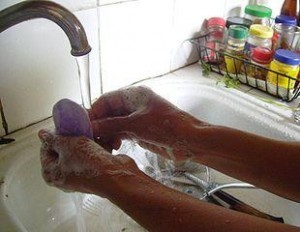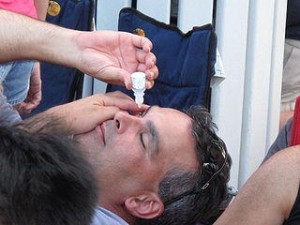What To Do For A Chemical Eye Injury And Burning
Injuries from chemicals are a common part of life. It is not only from strong industrial chemicals but even from everyday household items and certain spices. Chemical injuries can affect any part of the surface of the body with which it comes into contact. However, it is usually worse when it makes contact with the eye since it is living tissue that lacks the hard protein layer of the outer skin apart from the protection offered by the eyelids. A quick remedy is often needed until professional medical attention can be sought.
All types of chemicals can cause an injury to the eye. It does not even have to be directly introduced to the eye. These chemicals may be present in gases within the air, in detergents, pesticides, spices and deodorants to name but a few. Even a simple and safe item like toothpaste can cause significant inflammation when it makes contact with the eye. Although the injury may not seem severe, nobody wants to be writhing in pain until the inflammation subsides. It is only natural to want to take action.
It is important to understand the basic structure of the visible portion of the eye which is most likely to be affected in a chemical injury. The outer layer of the visible part of the eye is lined with a thin clear layer known as the conjunctiva. It is intended to protect the eye from the environment but cannot compare to the hardiness of skin. It is often this conjunctiva that gets irritated or inflamed with superficial chemical injuries. This is known as conjunctivitis and specifically acute traumatic conjunctivitis. It should not be confused with infectious conjunctivitis that we often refer to as pink eye. If the offending chemical is harsh, it can quickly penetrate the conjunctiva and affect the underlying tissue of the eyeball with more serious consequences.
Do not rub the eyes
The burning, itching and pain in the eyes will naturally elicit the desire to rub the eyes. But this is one of the worst things you can do. Rubbing can further irritate and injure the tissue and therefore worsen the inflammation that is present. It can also cause tears to the surface tissue of the eyeball which is weakened by the current injury. Microorganisms may be introduced into the eye, either from the air or the hands, thereby leading to an infection which can have serious consequences.
Wash hands thoroughly
One of the common ways that a chemical is introduced into the eye is through the hands. It is therefore important to wash your hands with soap and water before you start washing your eyes. Most of us can manage washing our hands with ease even if we cannot see clearly. This will ensure that the chemical is removed from the hands and that you can then tend to the eyes. Even if the hands are free of the chemical irritant, washing will remove dirt and microbes on the hand which may be introduced into the eye.
Flush the eye with warm water
Once you have ensured that your hands are suitably clean, you should try to flush out the chemical from your eye. The quickest way to do this is to cup the hands and try to splash the water into the eye. However, this is not a very effective means of flushing. Rather you should step into the shower, turn on the water and let it hit your face around the eye region. Ensure that it is on a gentle spray and that the water is lukewarm. Hot water will worsen the inflammation. Alternatively tilt your head to the side under the faucet and let the running water flush out the eye.
Use clean towels when wiping
Just as important as the washing is how you dry the eyes afterwards. Try not to dry the eye region if possible. But if you have to then use a clean towel. Do not let the towel touch the eyeball itself. Remember that apart from flushing, your tear glands and eyelids do a good job of rinsing the eye and pushing away any debris or chemicals. Let it happen naturally. The towel can injure the already inflamed eyeball further during wiping. And even the cleanest towel may contain microbes that can be introduced into the eye thereby increasing the likelihood of an infection which may have more serious consequences than the injury itself.
Do not let anybody blow in your eye
It is common practice to want to blow in the eye when there is a gritty feeling or burning in the eyes. It may be a speck of sand or an eyelash and a quick blow pushes the irritant away. We all do it at some time or the other. But when it comes to a chemical injury to the eye, this is unlikely to be helpful. In fact it could make matters worse. The human mouth is teeming with different species of bacteria and some can cause very serious infections. By blowing the eye, these microbes are being propelled onto the eyeball. Once again it increases the chance of an infection later.
Try to blink naturally
Most of us do not give blinking a second thought. But when we sustain an injury to the eye, we become very conscious of our blinking. Try not to blink too much or too little. Just let the natural blinking pattern continue. This process is both under voluntary and involuntary control. The muscles can be controlled at will but blinking is done on its own without conscious thought. The body is well aware of how often to blink or not when dealing with an injury so try not to upset this balance.
Avoid medicated eye drops
While flushing the eyes with clean water is advisable, try not to use eye drops that you may have purchased over-the-counter or that have been prescribed by a doctor. The chemicals within these eye drops could react with the chemicals irritating the eye to form an even more potent irritant. There is no way of saying for sure whether medicated eye drops would be safe to use during a chemical injury of the eye and so it should be avoided altogether unless a doctor says it is safe to use. Stick with water or contact lens solution to rinse the eye.
Wear sunglasses to the ER
Once you feel that you are stable enough to travel, it is a good idea to seek professional medical attention. This would mean a trip to your doctor or the nearest hospital emergency room. Never drive yourself. Rather get somebody to drive you or wait for emergency medical services to arrive at your home. Protecting the eye during the trip is advisable. Keeping your eyes closed would work but it may not always be practical to do so in transit. Rather use a pair of sunglasses. It will also protect you against light since your sensitivity to light will increase after an eye injury.







